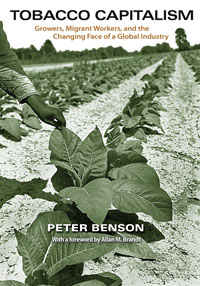
Most research that focuses on tobacco examines health risks associated with smoking, says Peter Benson, PhD, a sociocultural anthropologist at Washington University in St. Louis.
What has been neglected is research on tobacco production in the United States, and specifically on the people who work and live in the rural, traditional tobacco-growing areas of North Carolina.
Benson’s new book, Tobacco Capitalism (Princeton University Press, 2011), examines the impact of the transformation of the tobacco industry on farmers, workers and the American public. It reveals public health threats, the impact of off-shoring, and the immigration issues related to tobacco production.
The book also examines the new public relations strategies of the tobacco industry and its recent corporate social responsibility “makeover”.
“There are whole groups of people — farmers and farm workers — in our society who dedicate themselves to growing a crop that is vilified,” says Benson, assistant professor of anthropology in Arts & Sciences.
“But this book is not just about good people doing a bad thing. What I found was, in going to North Carolina and going to these farms, that the story becomes much more complex.”
http://youtu.be/drG-hTDzJmo
Pressure on farmers and questions of identity
Tobacco farms often go back generations. A father’s father’s father farmed land still owned by his great-grandson.
Tobacco farmers take great pride in their family’s history and role in tobacco production, Benson says.
But like many other American industries, tobacco companies are increasingly purchasing their products overseas, buying more tobacco leaves from farmers in places like Brazil and fewer from farmers in North Carolina, Benson says.
“Tobacco is cheaper to produce in developing countries because the labor costs are lower and there are less stringent environmental and labor laws,” Benson says.
Not only is less American tobacco leaf being bought by tobacco companies, but also what is purchased from U.S. farmers is bought at increasingly lowered prices to compete with overseas farms.
As their relationship with tobacco companies deteriorates, tobacco farmers also face public derision and sometimes internal ambivalence about growing what is widely seen as a dangerous product.
Off-shoring. Lowered prices. Negative public perception. With all these issues swirling, many tobacco farmers see their livelihood and family heritage — their identity — as under attack from many sides.
“Tobacco growers in North Carolina are understandably distressed,” Benson says. “And there’s hardly any relief from a public that often sees smoking, and I think rightly so, as something that ought not exist.”
Public health risks and immigration issues
The public health effects of tobacco production go beyond the risk of tobacco use itself, Benson says. It also shows in the chronic vulnerability of the migrant workers who harvest it.
Many of the workers who harvest the tobacco crop are undocumented migrant farm workers from Mexico and Central America, Benson says. They live in “labor camps” of barracks-style housing, often dilapidated or poorly constructed.
“These are dangerous places to live,” Benson says. “Labor camp conditions for migrant farm workers are notoriously bad. There might be housing code violations, insect and rodent infestations, and, in the North Carolina summer, heat — intense, oppressive heat.
“They are living as a vulnerable population without resources, without access to certain things like health care, legal services and employment benefits,” Benson says. “And yet, they are there, going to Wal-Mart on Saturdays and Sundays, just like everybody else.”
With many farmers already feeling a sense of insecurity about their livelihood and identity, a change in their small, rural communities — such as an influx of immigrant workers — can lead to cultural tensions.
“Hiring undocumented workers to compete economically with cheaper foreign leaf challenges the cultural status of family farms as national icons,” Benson says. “It also puts tobacco farmers at the heart of contentious political debates in the U.S. about immigration.”
Tobacco company marketing strategies
Since the late 1990s, tobacco companies have undergone what Benson calls a “corporate social responsibility makeover,” shifting responsibility from the companies (for making a harmful product) to consumers (for supposedly choosing to use it) and claiming to create “safer” tobacco products.
“They are telling the public, ‘Look, we are a responsible corporate citizen. We make a risky product, yes, but it’s your choice to use it. You are a parent. Help your kids make good decisions.’
“They’ve rerouted responsibility for tobacco onto parents, convenience store clerks, police officers, people checking identification cards, so that tobacco and smoking seem to be a problem of bad parenting and the family, not an inherently harmful industry,” Benson says.
Tobacco companies also are promoting smokeless tobacco, electronic cigarettes and cigarettes with modified tobacco content as “safer” alternatives to cigarettes.
Problem is, there’s no such thing as safe tobacco use, Benson says, and people may be misled into thinking they are making a good choice by purchasing these “safer” products.
“The tobacco industry wants you to go to the convenience store, and instead of buying a pack of Nicorette gum because you want to quit cigarettes, it wants you to choose that reduced-risk tobacco product,” Benson says.
“Safe tobacco. Safe cigarette. Those words just don’t go together.”
Benson compares tobacco companies’ “safer” tobacco to pharmaceutical companies’ cholesterol-reducing drugs like Lipitor.
“If cholesterol is to be managed by Lipitor, and Lipitor is to be taken for your entire life, then that distracts attention, public health resources and political will from the idea that you can prevent high cholesterol in other ways — for example, by modifying the food system at much lower cost — but not to the benefit of the pharmaceutical industry,” Benson says.
Instead of managing the problem of disease through a narrow focus on the consumer, Benson says, Americans, as a society, should really examine the root causes of chronic disease, especially the role of powerful industries like tobacco.
For more information about the book Tobacco Capitalism, visit press.princeton.edu/titles/9612.html.